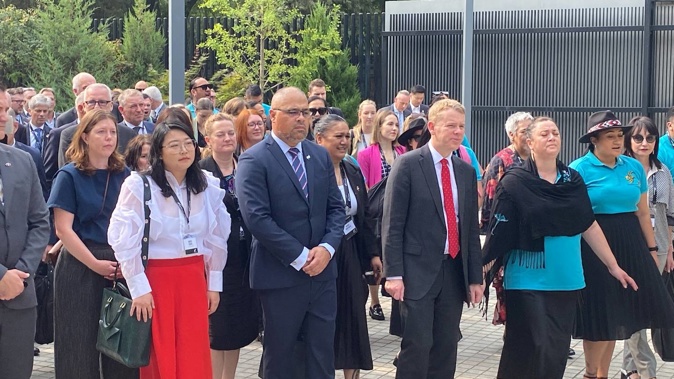
Prime Minister Chris Hipkins found himself in the midst of a war of words between international media on his first day in Beijing.
Chinese state media reported over the weekend that New Zealand was setting a good example to countries like Australia in terms of managing their relationships with China - and even held out the prospect of increasing flows of international students to New Zealand’s cash-starved universities.
Meanwhile, The Australian newspaper reported China gave New Zealand a browbeating when Foreign Minister Nanaia Mahuta visited in March. Hipkins is trying to stay above the fray saying the “crystal clear” message of the trip is that New Zealand is open for business.
“The purpose of our visit is to send one crystal clear message and that is New Zealand is open for business and that we value our relationship with China,” he said.
Hipkins will address these matters in a stand-up at 4.30pm New Zealand time.
Hipkins also faces a domestic storm over his use of two Defence Force planes to fly to China. Hipkins took about 100 people to China, including 29 business delegates, on the Government’s ageing, breakdown-prone Defence Force plane. A second plane followed the delegation to Cairns and later to Manila just in case the first broke down.
Chines state media have been positive about the visit, with state broadsheet People’s Daily saying New Zealand was setting a “good example” of how to balance relations between China and The United States.
/cloudfront-ap-southeast-2.images.arcpublishing.com/nzme/PSC2GHDBF5GVLJRA6IXLRBIMWQ.jpg)
Chinese troops awaiting Chris Hipkins' arrival. Photo / Nathan Mckinnon-Pool
“In the increasingly complex international situation and with the Biden administration accelerating its alliance-building, New Zealand has set a good example for Western countries of how to balance its relations with both China and the US, and maintain strategic autonomy,” said the story in People’s Daily.
The story cited another piece, this time published in the tabloid Global Times, which said New Zealand had greater economic and diplomatic autonomy than Australia - a dig at Australia’s closeness to the United States.
Chen Hong, director of the New Zealand Studies Center at East China Normal University told the Global Times: “Grasping a major chance as the world enters the post-pandemic era, New Zealand has been able to exclude all kinds of pressures and influences to strengthen its relationship with China, setting a good example for other US allies of balancing well between its own interests in cooperating with China and its relations with Western countries.”
Shen Shishun, an Asia-Pacific affairs expert at the China Institute of International Studies, told the Global Times the visit showed the importance New Zealand attached to the relationship.
“Against the backdrop of growing protectionism and unilateralism, Hipkins’ first visit to China underscores the importance the New Zealand government attaches to its major trading partner,” Shen said.
Chen told the Global Times Hipkins would want to “attract more Chinese students to New Zealand universities through this tour… as most universities in the country have high rankings in the world and are known for their multicultural environment”.
Ambassador Grahame Morton appeared to address the reports of Mahuta’s visit speaking during a powhiri welcoming Hipkins to the Beijing embassy.
Morton said Mahuta had “a very good visit here in March”.
New Zealand has cleared the diplomatic calendar for this visit, giving it a near monopoly on political airtime.
Mahuta and Defence Minister Andrew Little were set to meet with their Australian counterparts this week, but that visit was postponed because it would coincide with Hipkins’ visit to China.
It is not the first time Australia and New Zealand’s approaches to China - and the potential economic upside to New Zealand’s softer approach - have appeared in the media.
In 2021, Trade Minister Damien O’Connor landed himself in trouble when he said Australia might learn from New Zealand’s approach and treat China with more respect.
“If [Australia] were to follow us and show respect, I guess a little more diplomacy from time to time and be cautious with wording, they too could hopefully be in a similar situation [with China],”
Take your Radio, Podcasts and Music with you








